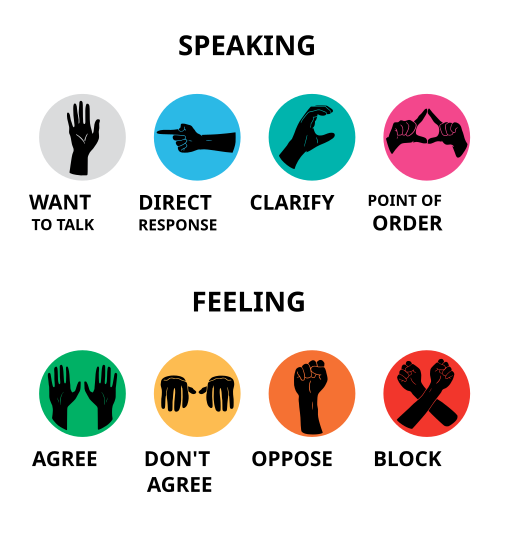8 Governance
3 groups) –>
How do open source projects make decisions?
Working in a project requires many decisions, e.g.,:
- Choosing a project name
- Deciding whether to add a color scheme
- Choosing whether to use UK or US spelling rules
- Deciding when to release a new version
Projects have a wide range of ways that they make these decisions (including avoiding having to make decisions!). We call these “governance models”.
Outside open source there are also many governance models, including very well known ones:
- Democracy (direct and representative)
- Dictatorship
- Corporate hierarchy
- Consensus
8.1 Recent innovations in decision making
While we may think the process of creating new models of decision making in groups has stopped or slowed, recent innovations abound:
- Occupy Wall Street Hand signals used during discussion at https://en.wikipedia.org/wiki/General_assembly_(Occupy_movement)
- New constitutions written by countries. e.g., Chile’s new constitution process 2022
Students and faculty at the University of Texas are involved with a project (and software) to compare the texts of Constitutions around the world.. Including using diffs (just like git does) to understand changes. e.g., changes in Algeria’s constitution (diff 1989 2020). “Constitute was developed by the Comparative Constitutions Project at the University of Texas at Austin and the University of Chicago, directed by Zachary Elkins and Tom Ginsburg.”
8.2 Exercise: Note-taking via google docs
You will be placed into groups of 3 (not sitting near each other):
- Create a google doc and share it
For next 2 steps follow two rules:
- You may not talk to each other
- You may not write instructions to each other in the Google doc (or elsewhere, e.g., chat)
- Working in this mode: produce a 2 page summary of:
Ross Gardler & Gabriel Hanganu. (2013). Governance models. OSS-Watch.ac.uk. http://oss-watch.ac.uk/resources/governancemodels
- Continuing to work in this mode: include within your text three comparisons with the work linked below (comparisons could include that the work agrees, disagrees, extends, adds example, etc.):
Karl Fogel. (2020). Chapter 8: Managing Participants. In “Producing OSS” Book. https://producingoss.com/en/managing-participants.html
- Create a final heading, “Reflections on working without talking”. Move to sit next to each other. Ironically, you can talk to each other as you write down at least 3 bullet points about your experience doing this note-taking.
